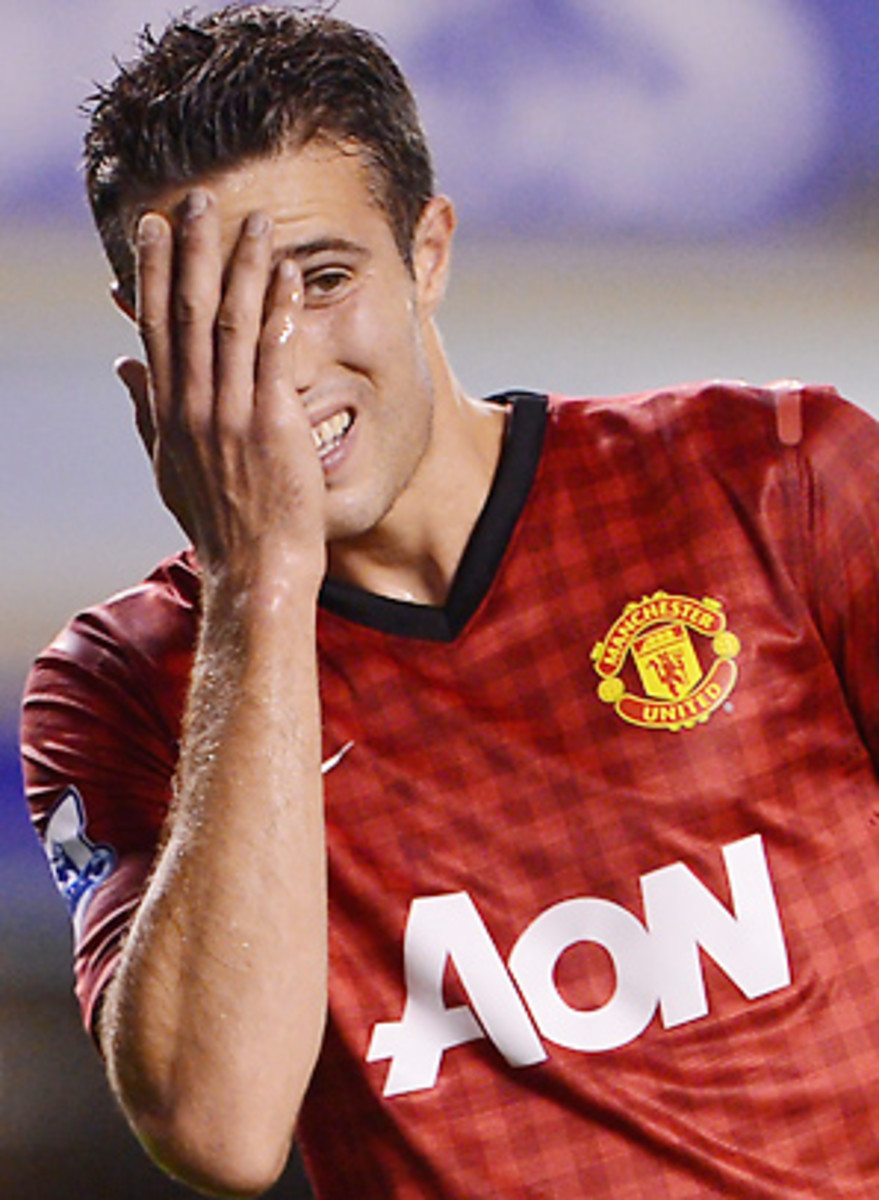Injuries hurting, but Man Utd failed to address its most pressing needs
"I asked for a sofa, and they bought me a lamp shade."
Rafa Benitez's 2004 departure from Valencia -- after a dispute with sporting director Jesus Garcia Pitarch -- brought one of the great expressions of managerial frustration. On Monday, in its 1-0 Premier League season-opening defeat at Everton, Manchester United was left wandering around looking for somewhere to sit down and seeing only covers for light bulbs.
Robin van Persie and Shinji Kagawa are excellent players. That is not in dispute. The question is whether they are the players United needed.
United has been unlucky with injuries, primarily among its defenders. Jonny Evans is recovering from ankle surgery. Phil Jones has been suffering from a muscular problem in his back. Chris Smalling likely will miss out for three months after surgery to repair a broken bone in his foot. When Rio Ferdinand suffered a groin injury in training last week -- an injury that may sideline him a month -- it left United with only one fit first-choice center back: Nemanja Vidic, who himself hadn't played since December because of cruciate ligament damage.
With central defense options exhausted, Sir Alex Ferguson had to choose between untried 20-year-old Scott Wootton and midfielder Michael Carrick. Ferguson opted for the latter, and Carrick's inability to deal with the aerial presence of Marouane Fellaini played a large role in United's loss at Goodison Park. Again and again, Fellaini won balls in the air -- highlighted by his goal, when he flattened Carrick while rising for Darron Gibson's corner -- and generally unsettled United.
Given Luis Antonio Valencia played at right back -- the winger operated in that role several times last season, but it is still not a natural position for him -- United effectively fielded only two defenders: Vidic and Patrice Evra. And Evra's form has declined sharply over the past 18 months.
"It was a pretty good game and there wasn't anything between the two teams," Ferguson said. "We were the better football team, they had eight shots on target and David de Gea did very well for us in that way. But we had the possession and made some great openings without actually finishing it. We were a wee bit in terms of finishing off the approach play we had. Other than that we played good football, good combination play, and on another day we would have won the match."
That is a very generous assessment. Not only did United lack defensive nous in the back four, but also it was lacking it in midfield. When United was overpowered by Manchester City on April 30 -- the game that tipped the title race in City's favor -- its midfield three was Carrick, Paul Scholes and Ji-Sung Park, who was just returning after a month out with injury and looked off the pace. On Monday, United started Scholes, Kagawa and Tom Cleverley; three superb passers, one of whom is arguably the worst tackler in Premier League history.
One of soccer's beauties is that there are myriad ways of playing it well. Barcelona has shown how effective a team can be packing a side with ball-keepers rather than ball-winners. But United is a long way from being Barcelona, despite its assistant coach Mike Phelan's claims over the weekend that the gap is closing. Again and again, the three midfielders were simply bypassed.
Kagawa is a high-quality player, and the £17 million transfer fee for the Borussia Dortmund star was probably a bargain. Two moments showed his class. Seven minutes before halftime, after receiving the ball under pressure in the middle of the Everton half, he threaded a pass to Danny Welbeck, who was arguably fouled by Phil Jagielka as he hooked a shot just wide.
Then, in the second half, the ball spun across goal, a fraction behind him. It would have been easy to try to drag a shot goalwards, although the proximity of Tim Howard meant the chances were any shot would be blocked. Instead, eschewing any lust for individual glory, overcoming the instinct that must exist in the six-yard box to simply force the ball goalwards, Kagawa laid the ball back to Cleverley. It was, undoubtedly, the right thing to do and had Cleverley's shot not happened to hit Phil Jagielka's foot on the line, it would have brought an equalizer.
But he is not the dynamic midfielder United needed. Again and again, Kagawa and Wayne Rooney ended up too close to each other. Both are intelligent and unselfish enough for the issue to be resolved -- and they may end up forming a fine partnership -- but the replication of roles served to highlight that Kagawa was enhancing the squad rather than answering a pressing need.
To accommodate both, Welbeck was shoved out to the left and Ashley Young omitted altogether. Welbeck, who never looked entirely comfortable in the role in his time at Sunderland, was ineffective Monday, his fruitful partnership with Rooney disrupted.
Van Persie's arrival as a substitute did little to resolve the issue; he started on the left and then moved into the center as United went to a 4-4-2. Again, he simply isn't what the club is most in need of; little wonder some have asked whether he was bought for his ability or because he represents an easily marketable sop to appease fans becoming increasingly concerned by the way the Glazer family is running the club.
It may be that these are teething problems and that a balance will be found. Defenders will return. But the pressing concern, as it has been for several months now, is the absence of a driving midfielder.
Perhaps Ferguson is confident Darren Fletcher will return from colitis, perhaps he believes Phil Jones can play in that position, but the refusal or inability to sign what is so obviously lacking is puzzling.






